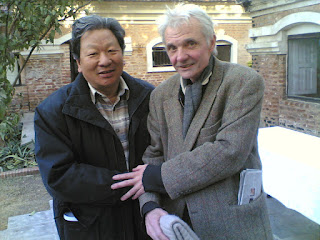I,
along with then SSP Rohit Thapa, had the honour of escorting His Royal
Highness Crown Prince to the villages of Kaski and Parvat districts. His
Royal Highness was to have a day-long trekking-cum- inspection of some
of the projects including drinking water and schools in the area. I
still remember the lesson taught by His Royal Highness about keeping the
trekking route clean of even small thrown-away wrappers of food and
water. His Royal Highness had not only carried his lunch bag on his back
but also picked up small pieces of papers and pocketed them in contrary
to the mess that the minister for education Sarbendra Nath Shukla and
his party had strewn at the site. His body guard carried the lunch
packet for the minister throughout the way to the villages. We all
Nepali should learn lessons to keep the environment clean of mess from
the Royal guest.
Bidding farewell to His Royal Highness Crown Prince at Pokhara airport when I was DIG
